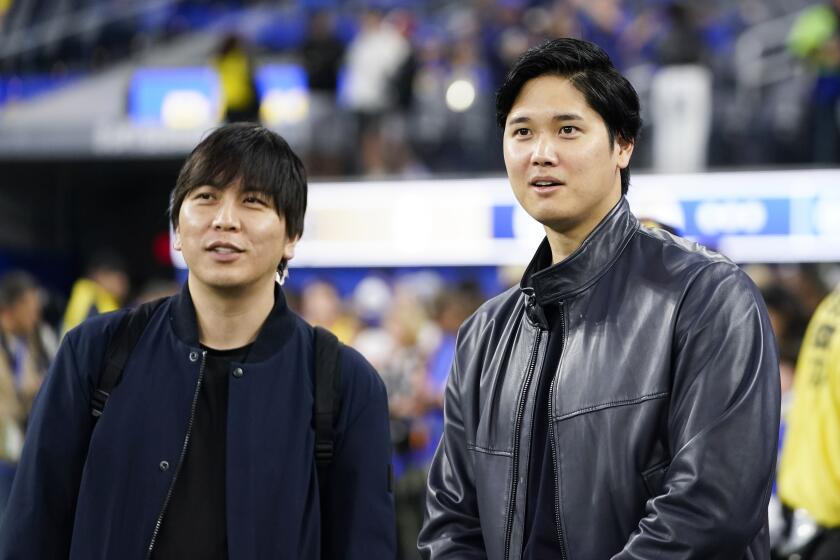Both Finley, Angels Owe Debt in Deal
Chuck Finley is not as rich as Charlie Finley, the old Oakland A’s owner who was smart enough to sell before the madness started, but at $2.5 million, he is rich enough.
And for that, Finley can thank:
Wally Joyner: He laid the groundwork, in more ways than one. Like Joyner, Finley had the salary screws applied during his early years with the Angels, who renewed his contract twice. Then Finley watched closely as Joyner qualified for arbitration and what happened to Wally next: Mushroom to $1.75 million in 1990, mushroom to $2.1 million in 1991. Joyner briefly held the record for the largest arbitration award--a record Finley would have obliterated had he stuck firm with the $2.8-million figure he filed. As it was, Doug Drabek got them both on Thursday with his award of $3,335,000.
Doug Drabek: The Angels had to have seen it coming--and must have noticed that Finley had the better earned-run average (2.40 to Drabek’s 2.76) while pitching in the league that hits. Finley also had more strikeouts, 177 to 131. And if Drabek was zeroing in on a $3,335,000 victory, what were the Angels doing offering Finley $1.75 million?
Roger Clemens: If he’s worth $5 million a year, Finley has to be worth half as much.
Matt Young: He will make $2.12 million this season for the Boston Red Sox. Which left-hander would you rather have?
Mark Langston: He will make $3.25 million this season for the Angels. If you’re Doug Rader, to whom do you hand the ball with the pennant on the line?
Kirk McCaskill: For a 12-11 season in 1990, the Angels gave McCaskill $2.1 million. So Finley had another precedent going in his favor. McCaskill is a fine pitcher who has been cursed by a problematic right arm, but you’ll never convince him that he should have stuck with hockey. McCaskill’s 1991 salary doesn’t rank among the top 50 in baseball, but in the NHL, it would place him third today--behind only Wayne Gretzky and Mario Lemieux. McCaskill chose wisely.
Mike Port: He stiffed Finley on earlier contract negotiations, and arbitrators tend to notice these things while mulling over their decisions. (See Joyner, 1990 arbitration ruling.) One more card stacked against the Angels.
Dave Stewart: Finley was a fastball pitcher mired in a go-nowhere middle-relief role until he noticed what the forkball did for the career of this one-time go-nowhere middle reliever.
Marcel Lachemann: So Finley enlisted the help of the Angel pitching coach, and within two years, Team Finley had mastered the pitch that took Chuck from 2-7 in 1987 to 16-9 in 1989.
Lance Parrish: Finley’s development of the forkball coincided with Parrish’s new dictum as Angel catcher: Pitch inside until it hurts. Finley did. In his two years with Parrish, Finley did the hurting, winning 34 of 52 decisions.
Tony La Russa: Back-to-back All-Star selections look impressive on any arbitration resume. Finley earned those bids, but deserving pitchers are neglected every year. Since La Russa picked the 1989 and 1990 American League pitching staffs, an assist is in order. One more is pending, come July.
Baseball owners everywhere: Be it sheer greed (probably) or guilt over Collusions I, II and III, the owners are the ones who created this salary mess. Finley is merely mopping up.
The Angels are out $2.5 million today when it could have been a lot worse.
And for that, they can thank:
Alan Hendricks: Finley’s agent enabled the Angels to save face and $300,000 by shaking hands on Thursday’s last-ditch offer to settle. Two hours later, and the Angels are in arbitration, heading for a big defeat.
Roger Clemens and Doug Drabek: Two more clients in the Hendricks stable. Having raked in $8,335,000 on those contracts, Hendricks was in a giving mood.
Dan O’Brien: The Angels’ senior vice president made one mistake--filing at $1.75 million was a gross miscalculation--but he didn’t compound it with another. His power breakfast with Hendricks paid off with the $2.5-million compromise. I wonder who picked up the tab.
The Angel offense: Twenty victories--that’s the magic number for pitchers approaching the negotiating table. Finley had 18 by Sept. 13 with three starts left but didn’t win again--despite a 1.96 ERA in those starts. That’s because the Angels scored a total of three runs in those games. Miserable clutch-hitting? The Angel front office would say just the opposite.
Arbitration: The irony, the irony. In an out-of-control, Bud Black-gets-$10-million market, is Chuck Finley a $3-million pitcher? Of course he is. Finley might be the best left-handed starting pitcher in baseball. But because of the parameters of the arbitration process, Hendricks and Finley were forced to set their own ceiling by filing at $2.8 million. At $2.5 million, the Angels got themselves a bargain.
In addition, the Angels would also like to express thanks that they are not the Pittsburgh Pirates. Already stung by the Drabek decision, the Pirates are going to pay Bobby Bonilla $2.4 million this year and are faced with the prospect of a $3.25 arbitration loss to Barry Bonds.
See what happens when you make the playoffs.
More to Read
Go beyond the scoreboard
Get the latest on L.A.'s teams in the daily Sports Report newsletter.
You may occasionally receive promotional content from the Los Angeles Times.






